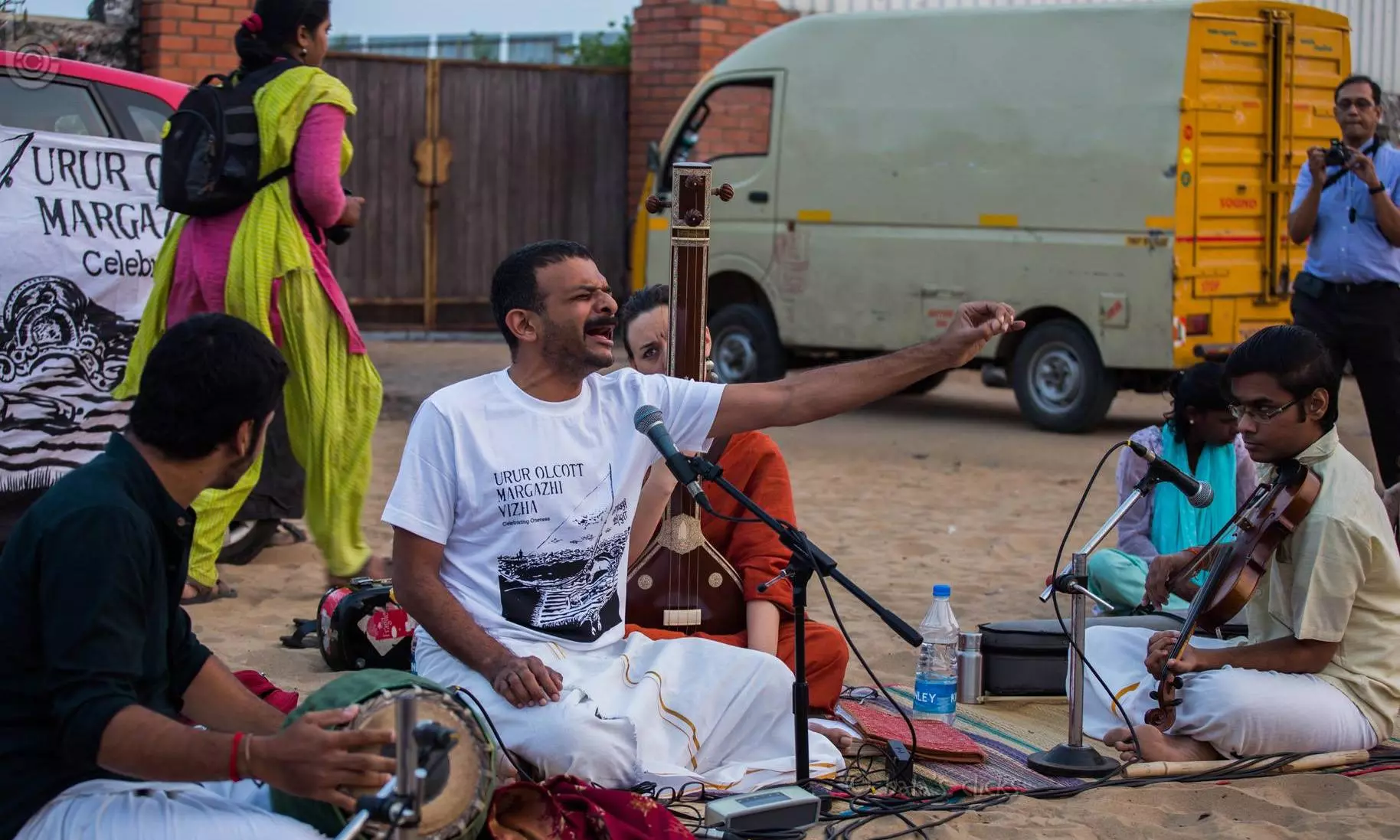
- Home
- India
- World
- Premium
- THE FEDERAL SPECIAL
- Analysis
- States
- Perspective
- Videos
- Sports
- Education
- Entertainment
- Elections
- Features
- Health
- Business
- Series
- In memoriam: Sheikh Mujibur Rahman
- Bishnoi's Men
- NEET TANGLE
- Economy Series
- Earth Day
- Kashmir’s Frozen Turbulence
- India@75
- The legend of Ramjanmabhoomi
- Liberalisation@30
- How to tame a dragon
- Celebrating biodiversity
- Farm Matters
- 50 days of solitude
- Bringing Migrants Home
- Budget 2020
- Jharkhand Votes
- The Federal Investigates
- The Federal Impact
- Vanishing Sand
- Gandhi @ 150
- Andhra Today
- Field report
- Operation Gulmarg
- Pandemic @1 Mn in India
- The Federal Year-End
- The Zero Year
- Science
- Brand studio
- Newsletter
- Elections 2024
- Events
- Home
- IndiaIndia
- World
- Analysis
- StatesStates
- PerspectivePerspective
- VideosVideos
- Sports
- Education
- Entertainment
- ElectionsElections
- Features
- Health
- BusinessBusiness
- Premium
- Loading...
Premium - Events

Atheism, Periyarism, Carnatic-music-in-slum project, choice of clothes...the singer just ticks boxes without sincerity
About a month or so back, a friend played me a recording of a Carnatic music concert. The singer's voice, the fluidity of his performance, and the intensity reminded me of musicians from previous generations.
I asked, "Who is this? I've never heard him before. He must be incredibly gifted."
Smiling, my friend showed me the video of the recording. A 20-year-old man with srichurnam (a religious marking on the forehead) applied on his forehead was singing a kirtana (musical composition) beautifully. He looked quite a bit like TM Krishna.
“Who is this?” I asked. “He looks just like Krishna…Is he his younger brother?”
To that friend, my friend replied, “This is TM Krishna, in his early years.”
My surprise bordered on shock.
COUNTERVIEW: For TM Krishna, a raga moves and breathes, and the singer participates in it
Lack of sync
I have been to some recent concerts of Krishna's. They left me pretty disappointed.
His shows included ‘progressive’ songs of Tamil writer Perumal Murugan and poet Bharathidasan. His repertoire included even the Thirukkural. I have nothing against the Thirukkural, but, in my view, it doesn't quite fit in well with Carnatic music.
If TM Krishna wishes to include more Tamil songs, there are many wonderful vakkeyakkaras (composers of Carnatic music lyrics) that he could choose from. Someone, for example, like Oothukkadu Venkata Kavi, who I feel is not represented enough in the Carnatic scene.
Superficial articles
I wrote when Krishna was given the Magsaysay award that he wasn't someone who truly deserved it. While his musical genius is undisputed, everything else that Krishna does seems to be just gimmicks. The articles he writes on music these days are increasingly superficial.
For instance, he once stated that sahityam (lyrics) is not crucial for Carnatic music, emphasising its reliance on raga. He further highlighted the fact that many rasikas (music lovers) don't comprehend Sanskrit, Telugu, or Tamil, the languages in which the lyrics are written, and that the music needs to transcend the text.
But why does Krishna, who made such statements, now seek out and sing songs composed by Perumal Murugan? Why does he, who believes that religious connotations undermine Carnatic music, and condemns the importance given to sahityam, sing about Allah? Why would an avowed atheist sing praises of Allah?
These contradictions make me doubt the sincerity of his actions and hence I label them 'gimmicks'.
Upper caste arrogance
Krishna goes to a few slums and teaches Carnatic music to the children. I would consider this act a classic display of upper caste arrogance.
Whoever told you, Mr Krishna, that there is no music in slums and among the Dalits? Economically, the slum-dwellers may be at the bottom; culturally they are not. In fact, elite culture has its roots in the slums, only in different forms.
However, Krishna seems to view these people and their art as inferior. His behaviour suggests that he believes in maintaining a cultural hierarchy, convinced of his art’s superiority.
By bringing Carnatic music to slum-dwellers, he perpetuates cultural violence.
Atheism and music
Next, let's talk about Krishna's atheism. Believing in God, or not, is a matter of personal freedom. No one has the right to interfere with that.
However, someone who takes up the garb of the priest isn't free to be an atheist. If he does, he is just being disrespectful to the devotees. An atheist priest can't perform his religious duties.
Similarly, a Carnatic musician who is an atheist sounds pretty unconvincing. Many might interpret this as an insult to Carnatic music itself. After all, Carnatic music is built on the foundation of bhakti (devotion), which is its essence and soul.
Thyagaraja immersed himself in his devotion to Lord Rama to compose his songs. Therefore, how could TM Krishna, who lacks faith in God, sing and truly appreciate Thyagaraja kirtanas? Can an atheist truly appreciate the essence of Gospel or Gregorian music? I am not convinced.
I have no doubt that Krishna is an exceptional musician. However, his gimmicks have overshadowed his rare talent. Thyagaraja's devotion to Lord Rama is deeply ingrained in his compositions. How can an atheist sing those melodies with the same voice and soul?
He can perhaps sing compositions by Bharathidasan and Perumal Murugan. But, let me ask, are these two writers true vakkeyakkars?
On following Periyar
Krishna says he follows (Dravidian reformist) Periyar. He even sings a Carnatic song about Periyar. But then Periyar did not like Carnatic music. If he was alive, he might take Krishna to court.
But that's not the point. Periyar was against loving one’s own language, nation or race over others. Today’s so-called ‘Periarists’ are on the other end of the spectrum — they are textbook fanatics who ceaselessly glorify their language, their land and their race.
So, will Krishna, who says he is a true Periarist, take on these fanatics head-on and sing out against Tamil and Dravida fanaticism? Unlikely.
Because, Krishna's involvement and understanding of the movement seem superficial. It is just one more checkbox in his endless collection of gimmicks.
Krishna and others who partially follow Periyar tend to focus only on atheism, as it’s the easiest aspect of Periyar's beliefs to adopt — atheism doesn’t pose any problems. After all, God doesn't concern Himself with what people say.
Beyond a fashion choice
Furthermore, when TM Krishna appears on stage for his Carnatic music concerts wearing a lungi, it appears to be nothing more than one more illustration of his puerility. The lungi is considered to be the attire of the lower classes while the dhoti has elitist connotations.
There’s a story about Dr BR Ambedkar being asked about his preference for coats and ties. The questioner remarked that while Gandhi chose to appear in a simple loincloth, Ambedkar stood out in his tailored suit.
In response, Ambedkar said: “Gandhi came from an upper-middle-class family. He can afford to wear just a loincloth now. But when I was in school, I could only afford the loincloth. Even now, my people haven’t progressed beyond the loincloth. They still live in poverty. It is through my life that I give them hope — the hope that education will liberate us. If I were to wear a loincloth like Gandhi, it would extinguish the light of hope for our people who have been living in poverty for more than two thousand years.”
In this scenario, when Krishna, educated in an international school and residing in an affluent society, wears the lungi, it is simply a fashion choice. It is not an act of renunciation like Gandhi’s nor a symbol of progress or hope like Ambedkar’s.
It is another gimmick, much like his other activities.
What Krishna can do
One important idea of Periyar’s is that chastity and family are tools created by patriarchal societies to oppress women. He tirelessly campaigned for women to break free from these constructs.
If Krishna truly follows Periyar’s beliefs, he could devote more of his time to singing against the concept of ‘female chastity’. A sincere fight against patriarchy can be far more worth his while than a gimmicky fight against just one religion's God.
(The Federal seeks to present views and opinions from all sides of the spectrum. The information, ideas or opinions in the article are of the author and do not necessarily reflect the views of The Federal.)


